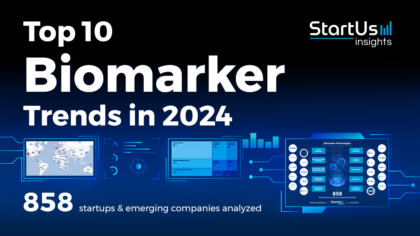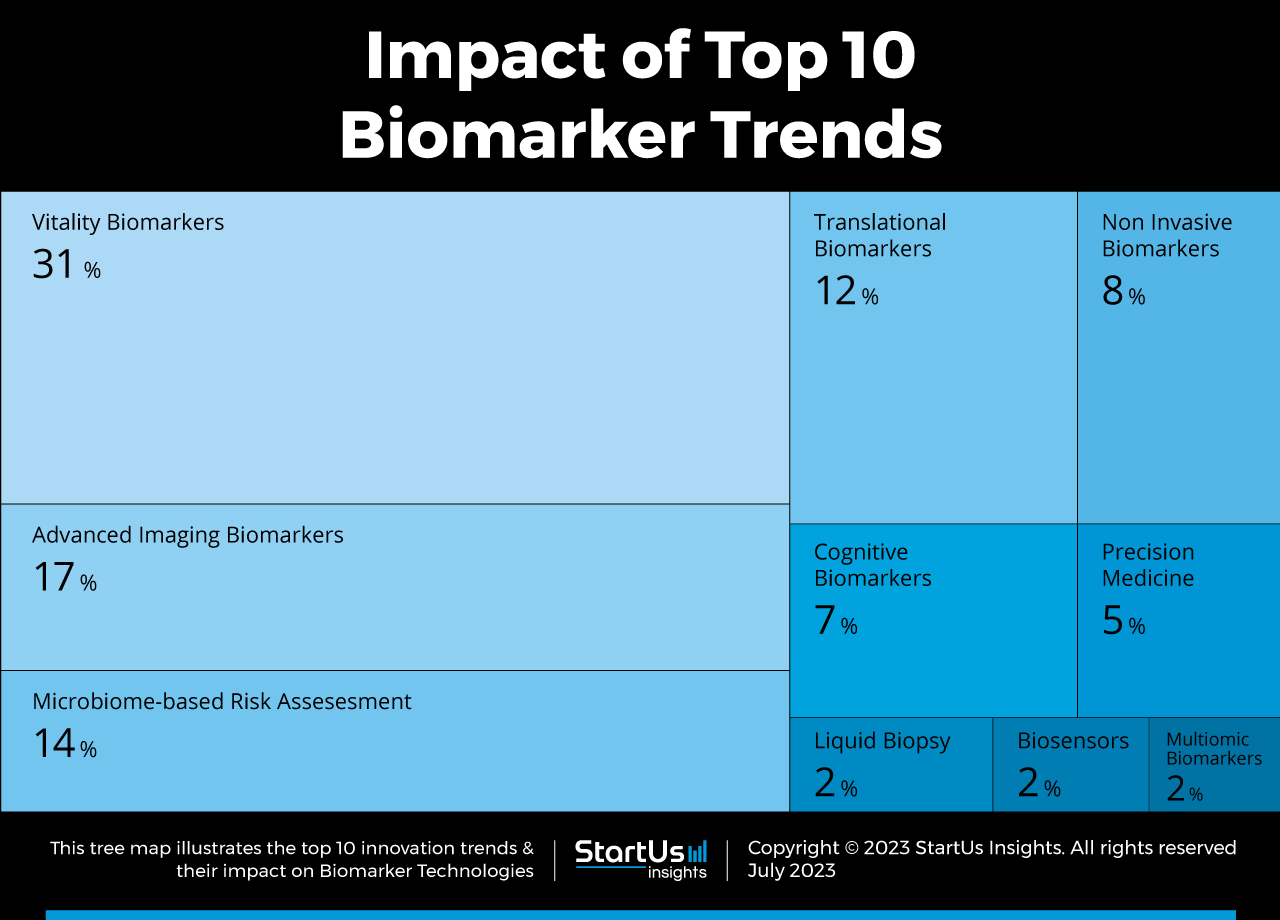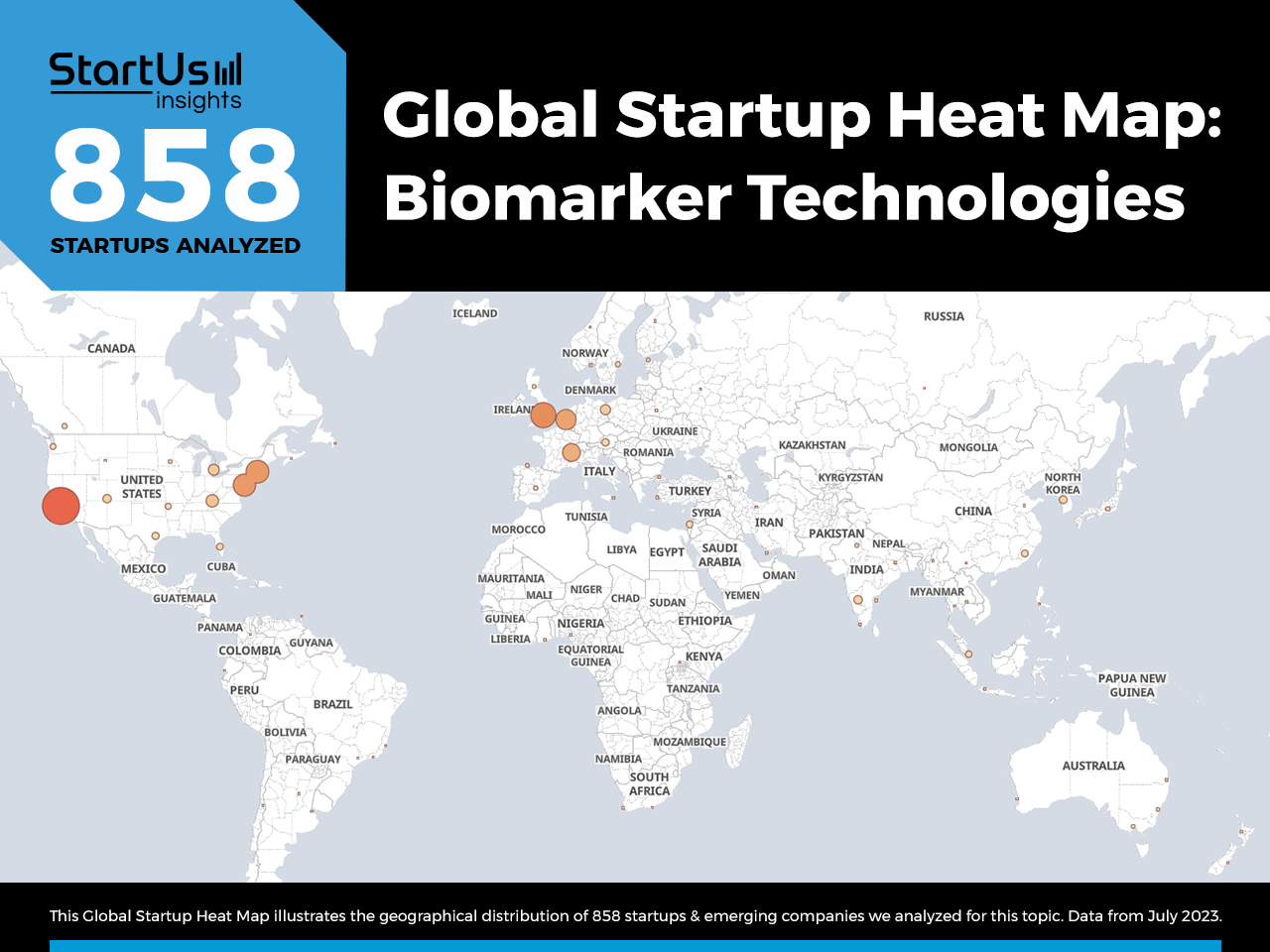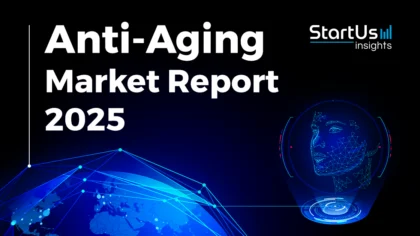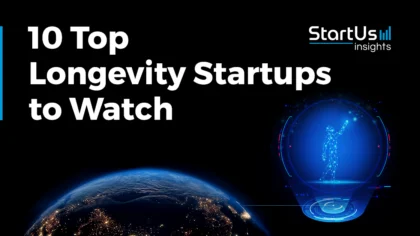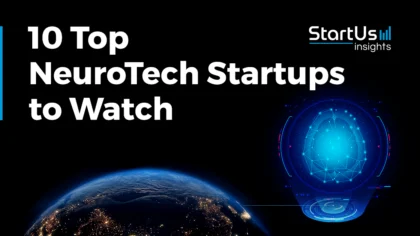Accelerate Productivity in 2025
Reignite Growth Despite the Global Slowdown
Biomarkers provide insights into vital health parameters and indicate potential health problems. Technological innovations in genomics, proteomics, metabolomics, and bioinformatics have accelerated the pace at which biomarkers are identified and validated. This leads to more precise diagnostics and targeted treatments. The top trends in biomarker technologies benefit healthcare and related industries by simplifying disease management and drug development.
Such solutions also have broad implications for the biotechnology and pharmaceutical sectors. This research focuses on the top 10 biomarker trends in 2024 based on our analysis of 858 emerging companies. Read more to explore how these technology trends ensure early detection, personalized medicine, and population health management.
10 Newest Trends in Biomarkers (2024)
- Vitality Biomarkers
- Advanced Imaging Biomarkers
- Microbiome-based Risk Assessments
- Translational Biomarkers
- Non-Invasive Biomarkers
- Cognitive Biomarkers
- Biomarkers and Precision Medicine
- Liquid Biopsy
- Biosensors
- Multiomic Biomarkers
Innovation Map outlines the Top 10 Biomarker Trends & 20 Promising Startups
For this in-depth research on the Top Biomarker Trends & Startups, we analyzed a sample of 850+ global startups & scaleups. The Biomarker Innovation Map created from this data-driven research helps you improve strategic decision-making by giving you a comprehensive overview of the biomarker industry trends & startups that impact your company.
Tree Map reveals the Impact of the Top 10 Advanced Biomarker Technologies
The use of microbiome-based risk assessments provides predictive insights about health conditions while translational biomarkers connect preclinical findings to clinical practice. Non-invasive biomarkers and liquid biopsies further reduce patient discomfort and promote regular screening.
Cognitive biomarkers offer a novel approach to the early detection and monitoring of neurodegenerative diseases. Moreover, multi-omic biomarkers integrate genomics, proteomics, and metabolomics data to generate better insights about diseases. Biosensors improve the capabilities of real-time point-of-care (PoC) diagnostics.
Global Startup Heat Map covers 858 Biomarker Startups & Scaleups
The Global Startup Heat Map showcases the distribution of 858 biomarker exemplary startups and scaleups analyzed using the StartUs Insights Discovery Platform. It highlights high startup activity in the US, followed by the UK. From these, 20 promising startups are featured below, selected based on factors like founding year, location, and funding.
Want to Explore Biomarkers Innovations & Trends?
Top 10 Emerging Technology Trends in Biomarkers (2024)
1. Vitality Biomarkers
Historically, global healthcare systems focus on a reactive approach to personal health and disease management. This presents significant challenges in early detection, cost-effective patient monitoring, and personalization of treatment plans. Therefore, startups are developing biomarkers that track or measure a person’s vitality to address these problems.
By using vitality biomarkers, medical professionals gauge a person’s health status before symptoms emerge. This enables earlier interventions and potentially prevents the progression of health problems. Moreover, wearables and Internet of Things (IoT) devices are democratizing these advancements by tracking vital health parameters in real-time. Additionally, these devices provide rich datasets for analysis and improve the quality of diagnostics.
Kyla specializes in Anti-Aging Solutions
Kyla is a US-based startup that provides personalized primary care to mitigate the effects of aging while extending lifespan and health span. The startup provides anti-aging treatments, advanced testing, AI-based analytics, and personal goal-setting to prevent illness and diseases. Its AI analyzes an individual’s complete DNA profile using advanced biomarkers to determine biological age.
This results in more accurate diagnosis and prediction of potential health risks. The startup also allows individuals to perform comprehensive remote blood work in the comfort of their own homes. Moreover, it requires only a simple finger prick to detect problems like stage 1 cancer, seek preventive care sooner, and preserve their healthspan.
Rforto Health optimizes Muscle Fatigability and Vitality Capacity Monitoring
Belgian startup Eforto Health builds a solution for monitoring vitality capacity. The Eforto System consists of an ergonomic dynamometer, a mobile app, and a remote monitoring platform. This system works by measuring key biomarkers including grip strength, muscle fatigability, and self-perceived fatigue through a validated 5-minute test protocol.
The applications of Eforto span across clinical research, prevention, and rehabilitation, enabling the tracking of physical reserves and vitality capacity. It is suitable for researchers conducting clinical studies, healthcare professionals in preventive care and rehabilitation, and individuals seeking to monitor their health and vitality.
2. Advanced Imaging Biomarkers
Traditional methods of diagnostics often involve long processing times to provide definitive results. During this time, patients may undergo ineffective treatments, leading to unnecessary costs, potential side effects, and, crucially, loss of life. However, advanced imaging biomarkers track changes at the cellular or molecular level in real-time. They provide tangible metrics of disease progression or regression.
For example, diffusion-weighted imaging (DWI) solutions assess the response of tumors to treatment by tracking water molecule movement. Additionally, functional imaging biomarkers measure metabolic responses to therapy in conditions like heart disease. Advances in radionics enable the extraction of large amounts of features from radiographic images using data characterization algorithms. This aids in precise disease characterization and prediction of treatment outcomes.
Additionally, novel PET tracers are being developed to image tau protein aggregates in the brain, potentially allowing earlier detection of Alzheimer’s disease before symptoms appear.
Dawako Medtech develops Modular Ultrasound Imaging
Dawako Medtech is a Spanish startup that offers an advanced ultrasound imaging analysis system, PIIXMED. It works in conjunction with conventional ultrasound imaging equipment and a proprietary wearable ultrasound scanner system. The startup’s cloud-based system leverages AI and features ultrasound image acquisition, storage, analysis, and more.
Additionally, The startup’s PIIXMED iSarc solution uses AI-powered quantitative ultrasound imaging biomarkers to diagnose the progressive loss of skeletal muscle. This solution provides medical professionals with a non-invasive, patient-friendly, and cost-effective clinical solution for diagnosing and treating conditions like sarcopenia. The startup’s ultrasound imaging analysis system and wearable ultrasound scanner facilitate early diagnosis and therapeutic follow-through.
Imaginostics advances Magnetic Resonance Imaging
US-based startup Imaginostics provides imaging technology that converts clinical scanners into diagnostic instruments. It captures quantitative signal intensity without the need for a baseline. Imaginostics’ solution uses quantitative ultra-short time-to-echo contrast-enhanced magnetic resonance imaging (QUTE-CE MRI) technology for quantitative, safe, and non-invasive diagnostics.
The platform’s technology and software are compatible with existing MRI scanners and hardware. It facilitates the visualization of the vasculature, health, and disease assays as well as the stratification of patient populations. Additionally, its software assists clinicians and scientists by enhancing vascular compartments using safe iron-oxide contrast agents. This improves diagnostics for brain injury, stroke, and chronic disease characterization.
3. Microbiome-based Risk Assessments
The complexity and variability of diseases make it difficult to establish a one-size-fits-all treatment. Moreover, this lack of personalization is primarily because conventional diagnostic methods fail to account for the influence of the microbiome. To tackle this, healthcare organizations leverage solutions that analyze the diversity, abundance, and function of microbial species. This assists in generating unique insights into an individual’s health status and potential disease risks.
Moreover, gut microbiome profiles are able to predict the risk of type 2 diabetes. Specific microbial signatures are associated with cancer prognosis and response to immunotherapy. Additionally, microbiome therapeutics are modulating the microbiome such as through probiotics or fecal transplants to treat or even prevent certain diseases.
BluMaiden Biosciences provides AI-based Biomarker Identification
BluMaiden Biosciences is a Singaporean startup that makes AI-based solutions to identify biomarkers and therapeutics within the human microbiome. The startup’s solutions include DAISY – a cloud-based platform with a continuously expanding database of microbiome metagenomics and disease biology. Its analytics platform, Keystone, for microbiome analysis finds use in clinical trial analysis and early disease prediction.
Further, the startup’s Microbiome Artificial Intelligence Drug ENabler (MAIDEN) utilizes a comprehensive database of disease biology and microbiome datasets. It facilitates the discovery of small molecule therapeutics, integrating computational biology and chemistry to enhance the precision of drug candidate identification. BluMaiden’s health report uses microbiome biomarkers to provide an in-depth assessment of microbial metabolism, antimicrobial resistance, virus traces, and more.
Digbi Health promotes Gut Microbiome & Genetics-based Digital Care
US-based startup Digbi Health makes a healthcare platform that offers personalized programs based on the gut microbiome and DNA. It combines genetics, gut microbiome, and continuous glucose monitoring to precisely characterize biology, food, and lifestyle. The platform also includes features like at-home gut biome and genetic tests, glucose monitoring, health coaching, meal analysis based on biology, and more.
Digbi Health’s solution utilizes biomarkers to identify and treat controllable conditions such as weight loss, digestive health issues like IBS, diabetes, mental health, and more. Additionally, its predictive AI engine stratifies patients by health risk and pharma cost as well as predicts the ideal care path.
4. Translational Biomarkers
Many lab-scale discoveries often fail to translate into effective clinical treatments, causing delays in treatments and unnecessary expenditures. At the same time, translational biomarkers show consistent effects in both preclinical and clinical settings. This allows researchers to evaluate therapeutic efficacy across various stages of development, thereby enhancing the probability of successful clinical translation.
Oncological translational biomarkers like PD-L1 expression or BRCA mutations are vital in the successful development and application of immunotherapies and PARP inhibitors. Likewise, in neurodegenerative diseases, biomarkers like amyloid-beta and tau proteins in Alzheimer’s align preclinical models with clinical disease, improving the predictive validity of the research. Translational biomarkers are reducing the uncertainty and failure rates associated with transitioning from labs to clinics.
Consequently, they are accelerating the pace of medical innovation and ensuring that more patients benefit from scientific research.
StratifAI uses Biomarkers for Precision Oncology
German startup StratifAI specializes in AI-powered biomarkers for precision oncology. The solution utilizes AI models trained on diverse datasets, including microscopy images, clinicopathologic data, and gene expression data. It further leverages transformer-based AI models for spatial biomarker discovery and multimodal AI for comprehensive cancer characterization. The solution enables the rapid development of customized AI models without the need for time-consuming manual annotations.
It provides diagnostic, predictive, and prognostic insights in oncology, offering personalized treatment plans and improved patient outcomes. The solution is suitable for oncologists, pathologists, and cancer patients.
BioTroy Therapeutics innovates in Translational Research & Target Validation
Chinese startup BioTroy Therapeutics creates a target identification platform – BioTroy Engine. It assists in the development of onco-immunology therapies by combining multi-omics with functional hypothesis-driven modeling and precise mining, characterization of immunological functions, and target validation methods.
The startup also focuses on antibody discovery and engineering to ensure a high level of diversity, affinity, and developability in the antibody discovery process. Its approach to antigen preparation, immunization, and screening strategies is driven by insights into the biological functions of the target and relevant physiopathological processes.
5. Non-Invasive Biomarkers
Patient compliance and comfort are constant challenges due to invasive diagnostic and monitoring procedures that are painful, stressful, or carry risks of complications. These hurdles lead to reduced patient cooperation, less frequent monitoring, and a lower likelihood of early detection of health issues, especially among children. Non-invasive biomarkers from accessible sources like breath, saliva, urine, or even sweat reveal vital health information without the need for procedures like blood draws or biopsies.
For example, by analyzing volatile organic compounds (VOCs) present in a patient’s breath, professionals identify diseases like lung cancer and diabetes. Besides, salivary biomarkers show promise in monitoring hormonal imbalances and infectious diseases with high accuracy and reliability. Developments in wearable technology further enhance the potential of non-invasive biomarkers, enabling continuous health monitoring.
PointFit Technology creates a Sweat Biomarker Monitor
PointFit Technology is a Hong Kong-based startup that focuses on health monitoring through sweat biomarkers. The startup’s skin patch features a flexible and ultra-thin nanomembrane that provides non-invasive, real-time, and continuous health monitoring. The patch does not require a wristband or any adhesive and measures localized muscle engagement through sweat, during sports activities.
Along with this, its companion app, PF-App, allows wearers to check their fatigue level instantly and offers real-time performance and recovery monitoring. The app also provides personalized recommendations based on a Predictive Muscle Fatigue (PMF) algorithm to ensure that people do not overtrain and injure themselves. PointFit provides PF-Dashboard for physicians to monitor the data or multiple wearers.
Kintsugi detects Voice Biomarkers
US-based startup Kintsugi detects signs of depression and anxiety from short clips of free-form speech. The startup’s platform, Kintsugi Voice, leverages novel voice biomarkers to identify, prioritize, and provide personalized care for an individual’s mental well-being in real-time. It operates by analyzing short clips of speech for elements like pitch, intonation, tone, and pauses.
Moreover, the platform is indifferent to language and does not use patient-sensitive information. Its companion app also functions as an advanced journaling and self-care platform powered by voice. The app lets patients talk comfortably and receive insights into their mental health. Kintsugi’s technology thus improves access to mental healthcare.

6. Cognitive Biomarkers
Current diagnoses of neurodegenerative and psychiatric disorders are performed through subjective clinical assessments. As a result, symptoms are only recognized in advanced stages, when substantial neurological damage has already occurred, impeding early intervention. Therefore, startups are developing cognitive biomarkers to indicate the presence and progression of cognitive disorders.
For instance, neuroimaging biomarkers, like volumetric MRI, detect brain atrophy associated with Alzheimer’s disease. Electrophysiological markers such as specific EEG patterns also signal the onset of conditions like Parkinson’s disease and schizophrenia. Through the use of these cognitive biomarkers, healthcare professionals diagnose and initiate treatment for cognitive disorders at an earlier stage.
SOMAREALITY offers Eye Tracking-based Biomarkers
SOMAREALITY is an Austrian startup that utilizes eye-tracking data to formulate digital biomarkers and offer insights into brain functions. The startup’s solution focuses on the creation and use of scientifically validated cognitive digital biomarkers for continuous monitoring. Utilizing real-time cognitive load analysis data, SomaReality’s technology provides more objective and personalized therapeutic approaches.
Additionally, cognitive biomarkers enhance conventional rehabilitation methods by providing data-driven insights into neurological processes. The startup’s technology finds application in mental health and wellness, offering a deeper comprehension of patients’ mental states and health. SomaReality’s technology also integrates non-invasive analytics with established rehabilitation methods. This provides valuable insights into patients’ experience with digital therapy applications for diagnosis and treatment.
LangAware enables Speech-based Disease Detection
US-based startup LangAware detects signs of neurodegenerative diseases through speech analysis. The startup’s product LANGaware combines AI and machine learning to identify subtle changes in speech to predict cognitive decline and psychiatric conditions.
The interactive speech app is language and location-agnostic and provides real-time and accurate results without the need for special equipment. The startup’s technology serves as a non-invasive, simple, and accessible solution for cognitive health monitoring.
7. Biomarkers and Precision Medicine
The variance of patient responses to standardized treatments is a critical challenge in care delivery. This lack of personalization results in suboptimal treatment outcomes, unnecessary side effects, and an increase in healthcare costs. Innovations in precision medicine tailor treatments based on a person’s unique genetic makeup and health history by integrating clinical and molecular information. This includes genomics, proteomics, and metabolomics which enable clinicians to identify specific disease subtypes and predict individual responses to therapies.
Targeted cancer therapies, like HER2 inhibitors in breast cancer, are selected based on the patient’s tumor genetic profile. This improves treatment effectiveness while minimizing side effects. Further, pharmacogenomics, an important aspect of precision medicine, optimizes drug selection and dosing based on a person’s genetic predisposition to metabolize and respond to specific medications. In this way, such solutions increase the chances of successful treatment.
The personalized medicine biomarkers market is projected to grow from USD 24.80 billion in 2025 to USD 78.27 billion by 2034, exhibiting a CAGR of 13.6% during the forecast period.
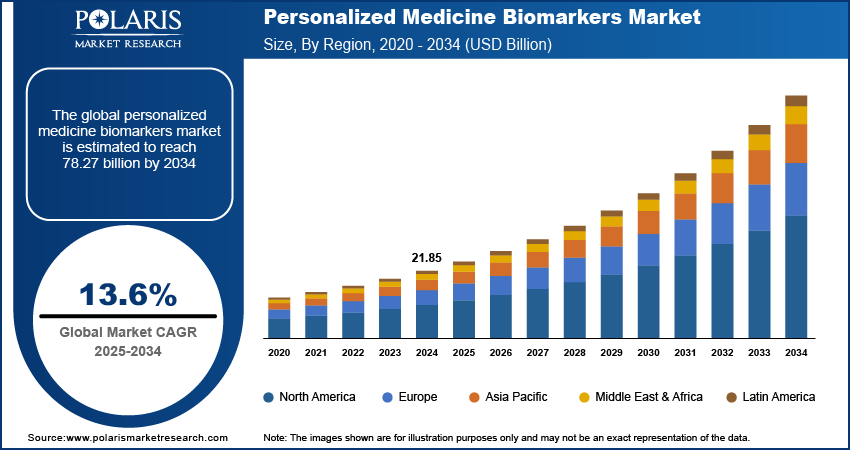
Credit: Polaris Market Research
Alto Neuroscience provides a Data-Driven Biomarker Platform
US-based startup Alto Neuroscience develops AI-based precision medicine for the brain. The startup’s AI platform uses biomarkers to align each medicine with appropriate patients to address the growing issue of mental health disorders. It evaluates brain function measures such as EEG, computerized behavioral tests, and wearables to stratify patients and match them with suitable drugs.
Besides, Alto Neuroscience utilizes genomics to establish a deeper understanding of drug effects at a molecular level. The startup’s biomarker platform incorporates a broad range of data and analysis methods, identifying responsive patients and propelling drug development. Alto Neuroscience provides a non-invasive, straightforward, and accessible approach to cognitive health monitoring.
Monument Tx advances Neuroscience Drug Development
Monument Tx is a UK-based startup that provides products to treat diseases of the central nervous system (CNS). The startup utilizes proprietary digital biomarkers to decrease heterogeneity, identify patients with homogeneous underlying neurobiology, and align them with suitably targeted compounds.
Monument Tx’s pipeline features two primary programs that address substantial CNS indications with significant medical needs. These include therapeutics for psychiatric problems such as cognitive impairment in schizophrenia, autism, and ADHD and neurological problems like chemo-brain. Moreover, its proprietary biomarkers enable the precise selection of patients who are most likely to benefit from treatment.
8. Liquid Biopsy
Biopsies are invasive and often require anesthesia, carrying risks such as infection and bleeding. It may not always provide a comprehensive picture of the disease due to tumor heterogeneity. This creates barriers to frequent monitoring, leading to less dynamic disease tracking. This is where minimally invasive techniques like liquid biopsies analyze biomarkers in a sample of non-solid biological tissues and solve these problems.
Liquid biopsies detect circulating tumor cells (CTCs) or fragments of tumor DNA or RNA (ctDNA or ctRNA) shed into the bloodstream. This allows for early cancer detection, treatment response monitoring, and residual disease or relapse detection. Notably, a liquid biopsy also captures the heterogeneity of the tumor, revealing genetic mutations that could inform targeted therapy choices. Thus, liquid biopsy delivers a safer, more patient-friendly, and comprehensive approach to cancer diagnosis and management.
Additionally, increasing the amount of priming agent in the cancer liquid biopsy may improve the process.
The global blood-based biomarkers market size was valued at USD 7.85 billion in 2024 and is projected to grow at a CAGR of 7.2% from 2025 to 2030.
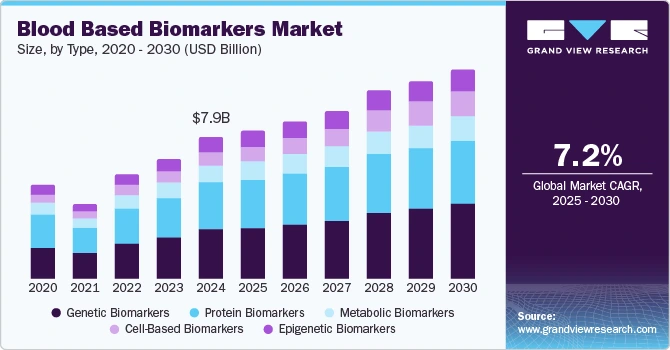
Credit: Grand View Research
Hedera Dx facilitates Circulating Tumor DNA Profiling
Hedera Dx is a Swiss startup that makes liquid biopsies globally accessible for cancer patients. The startup’s solution simplifies tumor profiling and enables hospital labs to conduct clinically actionable liquid biopsies on-site. Hedera Dx’s process begins with a simple blood draw followed by the extraction and sequencing of circulating tumor DNA (ctDNA) from the plasma.
Hedera Dx’s platform then provides a report that aligns EMA-approved therapies with the patient’s tumor ctDNA sequence. This report subsequently forms the foundation for discussions between the physician and patient regarding optimal treatment options. Hedera Dx’s initial solution caters to biomarker-guided treatment selection and provides crucial information for cancer patients.
BIOCAPTIVA manufactures a Biopsy Medical Device
BIOCAPTIVA is a UK-based startup that creates a medical device that simplifies the field of liquid biopsy. The startup’s core technology, msX, binds DNA natively from plasma, whole blood, and urine. This resists protein biofouling and allows large sample volumes to be processed without the addition of buffers or other reagents. This technology only binds free DNA in solution, not cells or proteins, ensuring the captured cfDNA is extremely pure and suitable for whole genome sequencing (WGS).
The scalability of msX technology makes it suitable for a broad range of applications, including in-vivo and ex-vivo applications. It also allows for the storage of DNA for multiple days before processing, benefitting situations where immediate sample processing is not possible. The end product is a clean and pure cfDNA sample, ready for various downstream laboratory applications.
9. Biosensors
A significant limitation in healthcare is the limited ability to continuously monitor patient health parameters, particularly in out-of-hospital settings. Traditional diagnostic methods are infrequent, time-consuming, and dependent on clinical visits. This is where wearable or implantable devices continuously and non-invasively monitor various health metrics such as heart rate, blood pressure, glucose levels, and even biochemical markers.
Biosensors provide real-time insights into patients’ health status and enable the prompt detection of abnormal changes. They allow for immediate intervention and potentially prevent serious health events. The integration of biosensors with digital health platforms and telemedicine further enhances patient care by enabling remote monitoring and rapid clinical response.
The global biosensors market size was estimated at USD 28.44 billion in 2023 and it is expected to reach USD 58.44 billion by 2033 at a compound annual growth rate (CAGR) of 7.9% from 2024 to 2033.
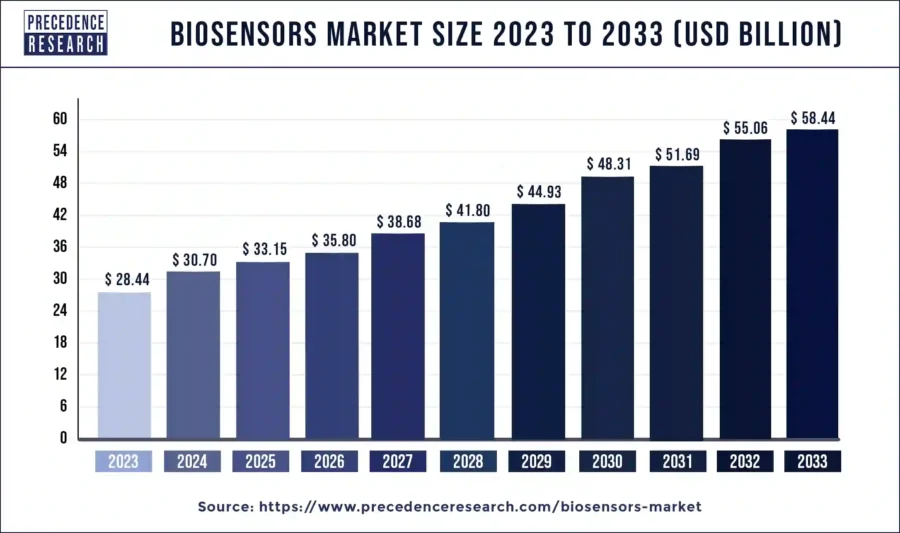
Credit: Precedence Research
Delta Diagnostics aids Biomarker Validation with Biosensors
Delta Diagnostics is a Dutch startup that offers a platform for the research and development of new multi-biomarker assays for diagnostics. The startup’s technology features integrated photonics that carries wave guides to transport laser light across the chip to many integrated sensors. The sensitive refractive index of sensors detects the binding of biomolecules on the sensor surface, leading to a local change in refractive index.
The technology allows for multiplexing, with each sensor being functionalized with a different capture molecule. This enables the simultaneous detection of many biomarkers, even in small and complex samples. Delta Diagnostics’ technology is label-free, resulting in faster assays that require fewer reagents. The label-free detection also allows for real-time monitoring of biomolecule binding, significantly reducing the time needed for assay development.
IVD R.E.D Microfluidic Chip Service creates Microfluidic Biochips
IVD R.E.D. Microfluidic Chip Service is a Chinese startup that develops technology for biomarker detection based on electrochemical impedance spectroscopy (EIS). The startup’s vacuum module technology powers its product to create a tubing-free multi-functional microfluidic platform that offers a total analysis system.
The startup’s CoreTest system performs rapid on-site detection of acute kidney injury (AKI) biomarkers from a single drop of blood. It leverages the biomarker NGAL (neutrophil gelatinase-associated lipocalin), which is secreted at high levels into the blood and urine within two hours of kidney injury. CoreTest also provides NGAL levels within a short time frame, allowing for early detection of kidney damage before serum creatinine levels rise.
The startup creates a diverse range of electronic microfluidic detection chip systems to provide high-accuracy quantitative detection and safeguard health. By identifying patients at risk of AKI early, the startup’s technology enables clinicians to manage fluid levels, avoid nephrotoxic agents, and potentially prevent kidney damage.
10. Multiomic Biomarkers
Conventional diagnostics focus on a single layer of information like genomics. They do not capture the complex correlation of biological processes and environmental factors that contribute to diseases. To avoid this issue, startups are integrating information from the genome, transcriptome, proteome, metabolome, and even microbiome to better understand disease mechanisms and treatment strategies.
Multiomic analyses reveal novel disease markers, therapeutic targets, and mechanisms of drug resistance. It also helps researchers and physicians predict individual responses to treatments. Further, innovations in multi-omic profiling uncover novel genetic and epigenetic cancer drivers. It predicts responses to immunotherapies based on tumor mutation burden and microenvironment characteristics. By leveraging advances in multiomics, the healthcare industry provides more comprehensive, precise, and personalized treatments for better patient outcomes.
Research is being made to integrate proteomics, metabolomics, and genomics data, which is predicted to assist the discovery of novel biomarker panels that can predict heart attack risk with greater accuracy than traditional risk factors.
Sonrai Analytics innovates in Multi-Omic Data Integration & Analysis
UK-based startup Sonrai Analytics develops a cloud-based AI technology – Sonrai Discovery – for drug discovery. The cloud-based platform unifies and integrates data ranging from discovery, research, and development and even includes regulatory approval data. The platform combines AI and machine learning data interactions to offer biomarker insights.
Besides, multi-omic data management allows researchers to integrate diverse data sets from various sources, including internal servers, databases, and external platforms. This simplifies the process of accurate biomarker identification and precise target discovery. Sonrai Analytics’ proprietary tools and algorithms help deploy innovative cancer imaging solutions.
Mass Dynamics offers Proteomics Software-as-a-Service
Australian startup Mass Dynamics provides software for proteomics discovery. The startup’s software allows researchers to discover biological biomarkers, gain insights into disease mechanisms, and identify changes in protein levels. It supports various data processing workflows, including Label-Free Quantitative (LFQ-DDA) and Tandem Mass Tag (TMT) methods, and pushes heavy and repetitive processing to the cloud.
The startup’s software also addresses the ‘missing value’ challenge in proteomics data through machine learning and an unbiased extraction of MS1 data. Mass Dynamics’ proteomics software-as-a-service (SaaS) assists researchers in identifying biological biomarkers and new drug targets, as well as gaining disease insights with planned experiments.
Discover all Biomarker Trends, Technologies & Startups
Advances in next-generation sequencing (NGS) are enabling in-depth analysis of genetic variations linked to specific diseases. AI-powered analytics also offers an automated and comprehensive examination of vast amounts of biomarker data. Further, innovations, such as single-cell analysis, deliver unparalleled insights into the cellular makeup of diseases. Spatial transcriptomics opens the possibility of studying gene expression.
The biomarker trends and startups outlined in this report only scratch the surface of trends that we identified during our data-driven innovation & startup scouting process. Identifying new opportunities & emerging technologies to implement into your business goes a long way in gaining a competitive advantage.

